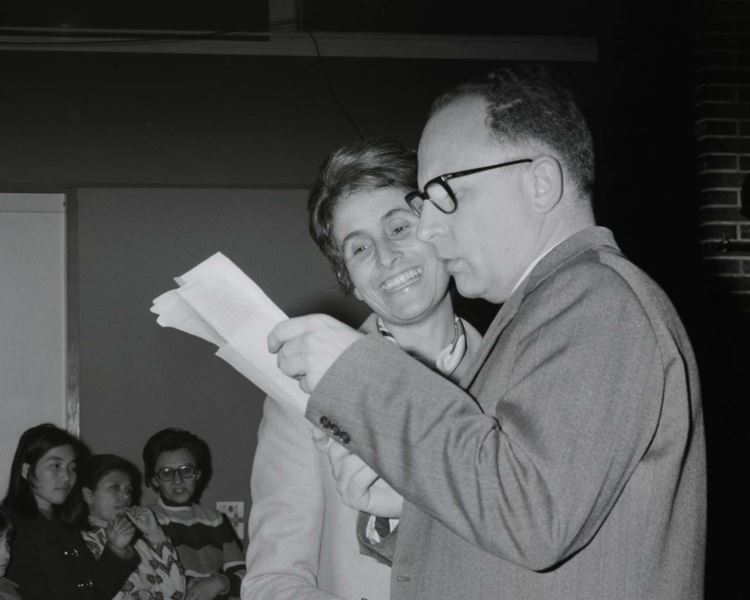
Oct 12, 2016 | Non categorizzato
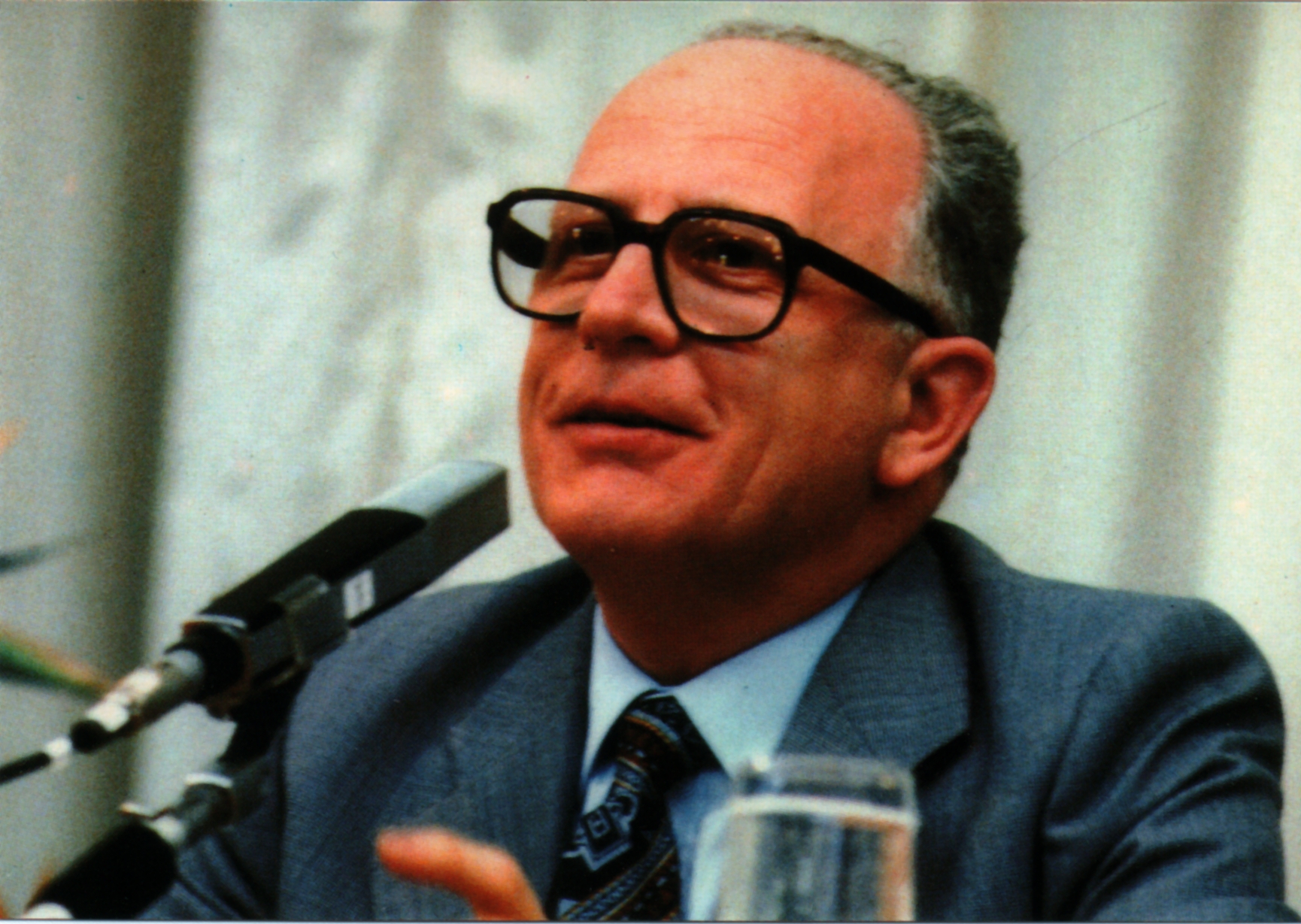 Lionello was born on October 10, 1925 in Parma, Italy. His family was wealthy and raised him to be honest and genuine. He attended high school during World War II and his attention was drawn toward civil society and social problems. In 1943 he enrolled in Law School and graduated with honors in 1947 after having done some prison time for providing help to the partisan movement. After the war he oversaw the educational and cultural activities of the Italian Catholic University Students, as well as the political activities of the Christian Democrats. He served the poor in the Saint Vincent de Paul Society, but feared becoming bourgeois. He joined in an initiative for young people who wanted to deepen their spiritual lives in the light of the Gospel. There he came to know Chiara Lubich‘s spirituality of unity and, in January 1950, Ginetta Calliari, one of the first focolarine. He recalls: “She spoke rather simply, but with quite a bit of conviction. […] The Christianity she was describing seemed so fascinating and fresh that it felt like I was hearing for the first time what Christianity was all about.” This spiritual growth was followed by professional growth becoming Italy’s youngest magistrate. In 1953 he attended the summer Mariapolis where he was immersed in the spirituality of unity. He met Chiara Lubich, Pasquale Foresi and Igino Giordani. Those days would mark his life forever. He remembers them in this way: “That community even though small had a certain completeness of its own: there were consecrated virgins and married couples, people that were not lacking in defects and naivetey. It was an organism into which the Lord had deposited a light, a law, a treasure that was destined to spread to the whole world.” At that Mariapolis he decided to consecrate his life to God in a focolare community. In 1961 he caused a bit of a stir when he left his profession (in the meantime he had been appointed Deputy Prosecutor of the Parma Judiciary) and dedicated himself completely to the Focolare. The weekly newspaper published an article on this Magistrate who had “given up the toga for a Bible.” In 1962 he was awarded the Premio della bontà (Goodness Award) by the Emilia Region of North Italy.
Lionello was born on October 10, 1925 in Parma, Italy. His family was wealthy and raised him to be honest and genuine. He attended high school during World War II and his attention was drawn toward civil society and social problems. In 1943 he enrolled in Law School and graduated with honors in 1947 after having done some prison time for providing help to the partisan movement. After the war he oversaw the educational and cultural activities of the Italian Catholic University Students, as well as the political activities of the Christian Democrats. He served the poor in the Saint Vincent de Paul Society, but feared becoming bourgeois. He joined in an initiative for young people who wanted to deepen their spiritual lives in the light of the Gospel. There he came to know Chiara Lubich‘s spirituality of unity and, in January 1950, Ginetta Calliari, one of the first focolarine. He recalls: “She spoke rather simply, but with quite a bit of conviction. […] The Christianity she was describing seemed so fascinating and fresh that it felt like I was hearing for the first time what Christianity was all about.” This spiritual growth was followed by professional growth becoming Italy’s youngest magistrate. In 1953 he attended the summer Mariapolis where he was immersed in the spirituality of unity. He met Chiara Lubich, Pasquale Foresi and Igino Giordani. Those days would mark his life forever. He remembers them in this way: “That community even though small had a certain completeness of its own: there were consecrated virgins and married couples, people that were not lacking in defects and naivetey. It was an organism into which the Lord had deposited a light, a law, a treasure that was destined to spread to the whole world.” At that Mariapolis he decided to consecrate his life to God in a focolare community. In 1961 he caused a bit of a stir when he left his profession (in the meantime he had been appointed Deputy Prosecutor of the Parma Judiciary) and dedicated himself completely to the Focolare. The weekly newspaper published an article on this Magistrate who had “given up the toga for a Bible.” In 1962 he was awarded the Premio della bontà (Goodness Award) by the Emilia Region of North Italy.

Loppiano: Lionello Bonfanti e Renata Borlone
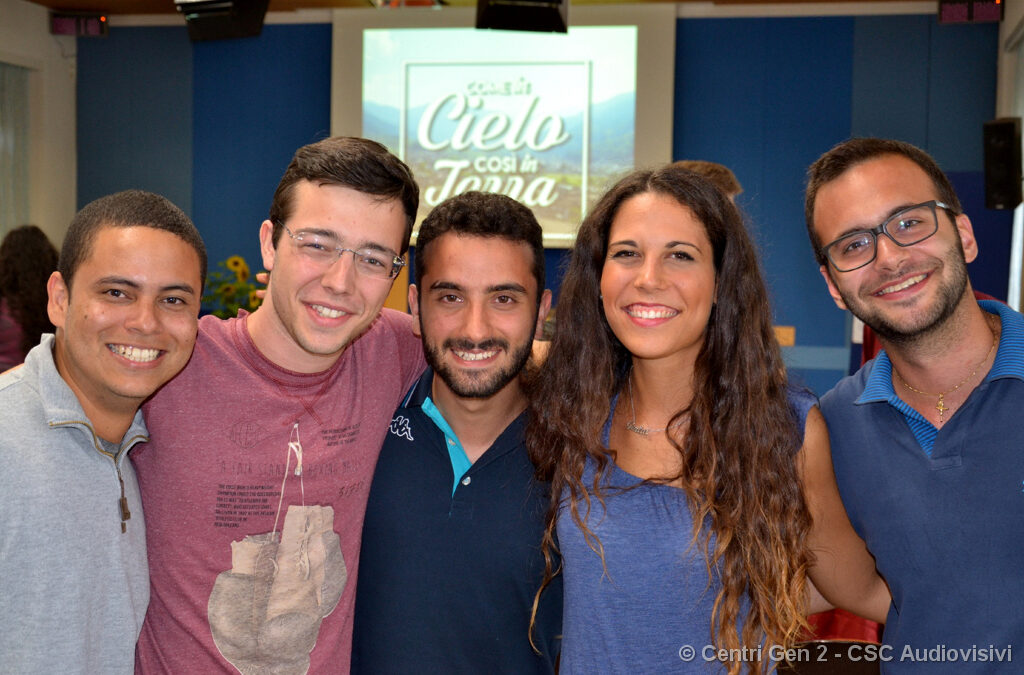
Oct 12, 2016 | Non categorizzato
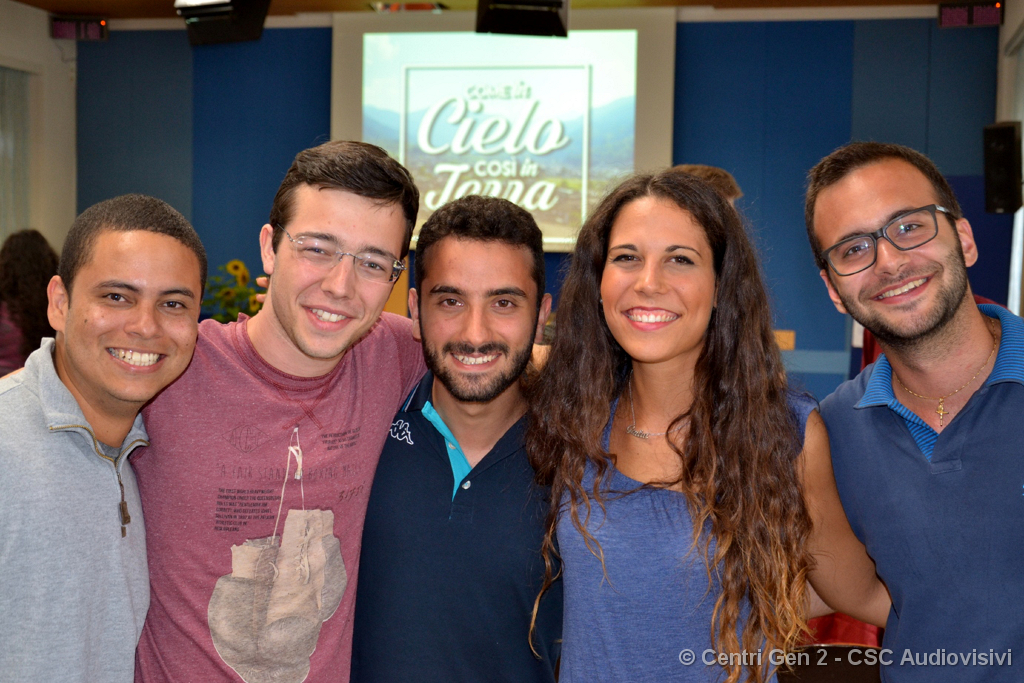 The XV General Assembly of the Synod of Bishops, to be held in October 2018, will focus on “Young people, the faith and discerment of vocation”. This decision of Pope Francis arouses joy and interest even in the Focolare Movement, especially in its branches for young members. The new generations have always been essential to the life of the Movement, in reciprocity with adult members, who accompany the young ones also in discerning their life goals. Here are some first impressions shared by young members of the Focolare in reaction to the news: “This is good news and it is also a response. The choice corresponds to the need. We already try to live our vocation in a bond with our faith, and not merely as a choice. It is time that these two realities are unified in our lives. We are so happy that the Pope has thought of us!”. (Gloria, Uganda) “Great news. If young people are not offered a good environment in today’s Church, tomorrow’s Church will lack good culture. I think Pope Francis wants to leave the Church in good hands. We need good ideas about living the vocation, not just about future choices: getting married, becoming a priest, a religious, a focolarino….In my Focolare formation I have learnt to consider the vocation as an anwer to a call that has to be lived also presently, right away. I hope that the Synod will also focus on this aspect so that the Church will be in good hands”. (Ryan, USA) “It’s a surprise! I am sure the Pope knows how to get to all young people. Many of those who no longer participate in the life Church, have shown great interest in his encyclical on the environment. I consider this synod as a great opportunity. It will be fantastic if it reaches everyone”. (Amanda, Brazil) “What I have learnt from the Catholic Church in the State where I grew up differs in certain aspects from its teaching in another State. Ideas vary even though the same material, as for example Youcat, is used. Globalization and social media put us in contact even with what the Church teaches in other parts of the world. Differences in approach on important issues can cause confusion in the absense of a clear voice.The Pope and the universal Church have a very important role in this, while they take into consideration the different cultures. I think the Synod offers excellent prospects”. (Aileen, India) “Young people are getting to know more about Church problems, especially about hot issues: scandals, social problems, Church and politics. In Peru, for example, such issues cause further distance between the position of the clergy and the reality of youth. The news of the Synod fills me with hope: the contribution and the ideas of the youth,using the media and the social networks in a transparent and convergent manner, can show a more human face of the Church.” (Jorge, Peru) “I grew up in the parish, and I think that the theme on vocation and youth should have been addressed years ago. Today we are in the midst of a crisis of vocations: family, religious life, as citizens, etc. So I say: Well done for chosing this theme”. (Damián, Argentina) “World Youth Days have shown the Church’s openness towards youth. Giving priority to youth shows that Pope Francis now wants to pass from words to deeds; even because we have to be the ones to find solutions for world problems. Sometimes one tends to think that we are unable to address problems, but together with mature and experienced persons we do arrive to solutions. It seems as if the Pope is telling us: you are ready for this challenge”. (Jorge, El Salvador) “Who knows what will really happen during the Synod! It would be great if some young people would actually be present. I think we all wish to have someone voicing us in this Synod”. (Jose Luis, Brazil) The young people of the Focolare Movement are also pleased because the Synod will take place just after the Genfest, when young people from the five continents will be gather in Manila, in July 2018. “This is a marvellous coincidence. We will be in the Philippines, in a continent with so many young people and to whom the Pope gives much attention. This time of preparation will help us understand how we can contribute towards the Synod”. (Jose Luis, Colombia) Source: Press releases (OFFICIAL INTERNATIONAL WEBSITE)
The XV General Assembly of the Synod of Bishops, to be held in October 2018, will focus on “Young people, the faith and discerment of vocation”. This decision of Pope Francis arouses joy and interest even in the Focolare Movement, especially in its branches for young members. The new generations have always been essential to the life of the Movement, in reciprocity with adult members, who accompany the young ones also in discerning their life goals. Here are some first impressions shared by young members of the Focolare in reaction to the news: “This is good news and it is also a response. The choice corresponds to the need. We already try to live our vocation in a bond with our faith, and not merely as a choice. It is time that these two realities are unified in our lives. We are so happy that the Pope has thought of us!”. (Gloria, Uganda) “Great news. If young people are not offered a good environment in today’s Church, tomorrow’s Church will lack good culture. I think Pope Francis wants to leave the Church in good hands. We need good ideas about living the vocation, not just about future choices: getting married, becoming a priest, a religious, a focolarino….In my Focolare formation I have learnt to consider the vocation as an anwer to a call that has to be lived also presently, right away. I hope that the Synod will also focus on this aspect so that the Church will be in good hands”. (Ryan, USA) “It’s a surprise! I am sure the Pope knows how to get to all young people. Many of those who no longer participate in the life Church, have shown great interest in his encyclical on the environment. I consider this synod as a great opportunity. It will be fantastic if it reaches everyone”. (Amanda, Brazil) “What I have learnt from the Catholic Church in the State where I grew up differs in certain aspects from its teaching in another State. Ideas vary even though the same material, as for example Youcat, is used. Globalization and social media put us in contact even with what the Church teaches in other parts of the world. Differences in approach on important issues can cause confusion in the absense of a clear voice.The Pope and the universal Church have a very important role in this, while they take into consideration the different cultures. I think the Synod offers excellent prospects”. (Aileen, India) “Young people are getting to know more about Church problems, especially about hot issues: scandals, social problems, Church and politics. In Peru, for example, such issues cause further distance between the position of the clergy and the reality of youth. The news of the Synod fills me with hope: the contribution and the ideas of the youth,using the media and the social networks in a transparent and convergent manner, can show a more human face of the Church.” (Jorge, Peru) “I grew up in the parish, and I think that the theme on vocation and youth should have been addressed years ago. Today we are in the midst of a crisis of vocations: family, religious life, as citizens, etc. So I say: Well done for chosing this theme”. (Damián, Argentina) “World Youth Days have shown the Church’s openness towards youth. Giving priority to youth shows that Pope Francis now wants to pass from words to deeds; even because we have to be the ones to find solutions for world problems. Sometimes one tends to think that we are unable to address problems, but together with mature and experienced persons we do arrive to solutions. It seems as if the Pope is telling us: you are ready for this challenge”. (Jorge, El Salvador) “Who knows what will really happen during the Synod! It would be great if some young people would actually be present. I think we all wish to have someone voicing us in this Synod”. (Jose Luis, Brazil) The young people of the Focolare Movement are also pleased because the Synod will take place just after the Genfest, when young people from the five continents will be gather in Manila, in July 2018. “This is a marvellous coincidence. We will be in the Philippines, in a continent with so many young people and to whom the Pope gives much attention. This time of preparation will help us understand how we can contribute towards the Synod”. (Jose Luis, Colombia) Source: Press releases (OFFICIAL INTERNATIONAL WEBSITE)
Oct 11, 2016 | Non categorizzato
For more information about the inauguration of Academic Year 2016/17, and to follow the live streaming of the event, visit official website: www.iu-sophia.org Official invitation (Italian)
Oct 11, 2016 | Non categorizzato
The congress, which takes place every three years, will this year include the 50th anniversary celebrations of the Gen Movement, the “new generation” of the Focolare Movement. In 1966, Chiara Lubich launched the “Revolution of Love” to the young people who were part of the Focolare. She explained that this meant aiming towards the fulfillment of Jesus’ testament “May they all be one”. Thousands of young people responded to this appeal and the Gen Movement was born. It spread throughout the world with members of every race, creed and social backgrounds. It also has the following of many young people who have no religious belief.
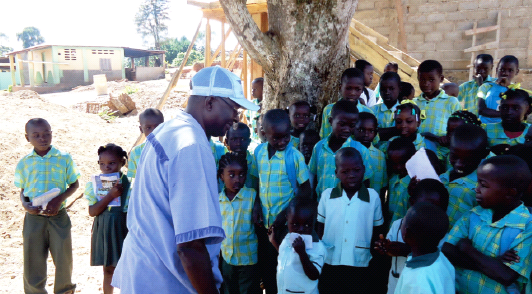
Oct 11, 2016 | Non categorizzato
 Our Adoptions at a Distance Project contact in Haiti, Wilfrid Joachim has informed us that in Mont-Organisé, a rural region in the Ouanaminthe district, in the North-Eastern part of Haiti, where New Families have many children sponsored by the project, that “while thankfully there are no victims due to Hurricane Matthew there is widespread devastation. In particular many farms with stables have been damaged extensively and so there are grave consequences for the livelihood of the rural population which thrives on agriculture and the breeding of livestock. (Source: AFN) The coordinated appeal for humanitarian assistance has been launched and contributions can be made to the following accounts: CAUSE: Emergency Haiti
Our Adoptions at a Distance Project contact in Haiti, Wilfrid Joachim has informed us that in Mont-Organisé, a rural region in the Ouanaminthe district, in the North-Eastern part of Haiti, where New Families have many children sponsored by the project, that “while thankfully there are no victims due to Hurricane Matthew there is widespread devastation. In particular many farms with stables have been damaged extensively and so there are grave consequences for the livelihood of the rural population which thrives on agriculture and the breeding of livestock. (Source: AFN) The coordinated appeal for humanitarian assistance has been launched and contributions can be made to the following accounts: CAUSE: Emergency Haiti
| Azione per un Mondo Unito ONLUS (AMU) |
Azione per Famiglie Nuove ONLUS (AFN) |
| IBAN: IT16 G050 1803 2000 0000 0120 434 at Banca Popolare Etica |
IBAN: IT55 K033 5901 6001 0000 0001 060 at Banca Prossima |
| Code SWIFT/BIC: CCRTIT2184D |
Code SWIFT/BIC: BCITITMX |
Contributions made to either of these accounts for the earthquake emergency cause will be jointly administrated by the Focolare’s Action for a United World (AMU) and New Families Association (AFN). There are tax benefits attached to such contributions in many countries of the European Union and in other countries.

Oct 11, 2016 | Non categorizzato
 Lionello was born on October 10, 1925 in Parma, Italy. His family was wealthy and raised him to be honest and genuine. He attended high school during World War II and his attention was drawn toward civil society and social problems. In 1943 he enrolled in Law School and graduated with honors in 1947 after having done some prison time for providing help to the partisan movement. After the war he oversaw the educational and cultural activities of the Italian Catholic University Students, as well as the political activities of the Christian Democrats. He served the poor in the Saint Vincent de Paul Society, but feared becoming bourgeois. He joined in an initiative for young people who wanted to deepen their spiritual lives in the light of the Gospel. There he came to know Chiara Lubich‘s spirituality of unity and, in January 1950, Ginetta Calliari, one of the first focolarine. He recalls: “She spoke rather simply, but with quite a bit of conviction. […] The Christianity she was describing seemed so fascinating and fresh that it felt like I was hearing for the first time what Christianity was all about.” This spiritual growth was followed by professional growth becoming Italy’s youngest magistrate. In 1953 he attended the summer Mariapolis where he was immersed in the spirituality of unity. He met Chiara Lubich, Pasquale Foresi and Igino Giordani. Those days would mark his life forever. He remembers them in this way: “That community even though small had a certain completeness of its own: there were consecrated virgins and married couples, people that were not lacking in defects and naivetey. It was an organism into which the Lord had deposited a light, a law, a treasure that was destined to spread to the whole world.” At that Mariapolis he decided to consecrate his life to God in a focolare community. In 1961 he caused a bit of a stir when he left his profession (in the meantime he had been appointed Deputy Prosecutor of the Parma Judiciary) and dedicated himself completely to the Focolare. The weekly newspaper published an article on this Magistrate who had “given up the toga for a Bible.” In 1962 he was awarded the Premio della bontà (Goodness Award) by the Emilia Region of North Italy.
Lionello was born on October 10, 1925 in Parma, Italy. His family was wealthy and raised him to be honest and genuine. He attended high school during World War II and his attention was drawn toward civil society and social problems. In 1943 he enrolled in Law School and graduated with honors in 1947 after having done some prison time for providing help to the partisan movement. After the war he oversaw the educational and cultural activities of the Italian Catholic University Students, as well as the political activities of the Christian Democrats. He served the poor in the Saint Vincent de Paul Society, but feared becoming bourgeois. He joined in an initiative for young people who wanted to deepen their spiritual lives in the light of the Gospel. There he came to know Chiara Lubich‘s spirituality of unity and, in January 1950, Ginetta Calliari, one of the first focolarine. He recalls: “She spoke rather simply, but with quite a bit of conviction. […] The Christianity she was describing seemed so fascinating and fresh that it felt like I was hearing for the first time what Christianity was all about.” This spiritual growth was followed by professional growth becoming Italy’s youngest magistrate. In 1953 he attended the summer Mariapolis where he was immersed in the spirituality of unity. He met Chiara Lubich, Pasquale Foresi and Igino Giordani. Those days would mark his life forever. He remembers them in this way: “That community even though small had a certain completeness of its own: there were consecrated virgins and married couples, people that were not lacking in defects and naivetey. It was an organism into which the Lord had deposited a light, a law, a treasure that was destined to spread to the whole world.” At that Mariapolis he decided to consecrate his life to God in a focolare community. In 1961 he caused a bit of a stir when he left his profession (in the meantime he had been appointed Deputy Prosecutor of the Parma Judiciary) and dedicated himself completely to the Focolare. The weekly newspaper published an article on this Magistrate who had “given up the toga for a Bible.” In 1962 he was awarded the Premio della bontà (Goodness Award) by the Emilia Region of North Italy.

Loppiano: Lionello Bonfanti e Renata Borlone

Oct 10, 2016 | Focolare Worldwide
 “We’ve known Khalid for more than ten years. One day he rang our doorbell to sell us something, but he mostly wanted to find a job. He had been in Italy for over a year, an illegal immigrant with nowhere to live. He was 24 years old and was from Morocco where he had left behind his mother, a widow with two children. A week later he came back. “I was hungry and you gave me something to eat … I was a stranger and you welcomed me” … The words of Jesus seemed to be calling out to us. In the afternoon we invited him to work in the flower garden and in the vegetable garden. In this way he was able to send a small amount of money to his mother. It was the first time he was able to help his family, and it made him happy. I got to work finding him a job, but the answer was always the same: he’s an illegal, we can’t hire him. Finally, I found him some seasonal work at an agriculture business. He worked nights an dslept with an Indian in a container: he had a hard life, but was happy. One day the telephone rang: his Indian friend told us that Khalid was not feeling well. Jesus was still calling: we went to visit him and took him to a docgtor who agreed to see him. He had a serious ear infection that needed care. We decided to take him in and let him share our son’s bedroom. Sometimes we had to wake up during the night to care for him. Our children were also quite caring towards him. The one who had given him work didn’t intend to obtain legal documents for him. We had become the last hope he could hold on to. The Lord asked us for an even more radical act of love. So we decided to hire Khalid as a domestic, and later the idea came of taking him and letting him stay at our house like another son. We let him some areas of the house for himself so that he could be independent. We respected his religious practices in preparing meals and scheduling around his prayers, especially during Ramadan. This brought our dialogue to a religious level. Our relationship became closer and closer. We spent time together in the evenings discussing our lives and his, along with our traditions. Difficulties and doubts were not lacking, but together with the help of the Focolare community that never failed to support us we found the strength to continue on. Providence was never lacking. A gentleman that we didn’t even know gave us a motorbike which we handed on to Khalid. People from the Movement provided clothing…. Then a job was found that allowed Khalid to help his family and to pay us back for some of the support we had provided for him. Around seven months later a house was left vacant where he could move with some of his friends. Then he went back to Morocco where he married. He returned to Italy with his wife, found a permanent job and is living a serene life. They had three children, two of which go to elementary school. A nice friendship was built with his wife even though she has trouble with the language. One day she wanted to show her gratitude by preparing a totally Moroccan meal at our house for us, which we enjoyed with our children. We’ve become the grandparents of their children who come to our house often! In our sharing with them we continually experience the joy of God’s presence among us.” (G.- Mantova, Italy)
“We’ve known Khalid for more than ten years. One day he rang our doorbell to sell us something, but he mostly wanted to find a job. He had been in Italy for over a year, an illegal immigrant with nowhere to live. He was 24 years old and was from Morocco where he had left behind his mother, a widow with two children. A week later he came back. “I was hungry and you gave me something to eat … I was a stranger and you welcomed me” … The words of Jesus seemed to be calling out to us. In the afternoon we invited him to work in the flower garden and in the vegetable garden. In this way he was able to send a small amount of money to his mother. It was the first time he was able to help his family, and it made him happy. I got to work finding him a job, but the answer was always the same: he’s an illegal, we can’t hire him. Finally, I found him some seasonal work at an agriculture business. He worked nights an dslept with an Indian in a container: he had a hard life, but was happy. One day the telephone rang: his Indian friend told us that Khalid was not feeling well. Jesus was still calling: we went to visit him and took him to a docgtor who agreed to see him. He had a serious ear infection that needed care. We decided to take him in and let him share our son’s bedroom. Sometimes we had to wake up during the night to care for him. Our children were also quite caring towards him. The one who had given him work didn’t intend to obtain legal documents for him. We had become the last hope he could hold on to. The Lord asked us for an even more radical act of love. So we decided to hire Khalid as a domestic, and later the idea came of taking him and letting him stay at our house like another son. We let him some areas of the house for himself so that he could be independent. We respected his religious practices in preparing meals and scheduling around his prayers, especially during Ramadan. This brought our dialogue to a religious level. Our relationship became closer and closer. We spent time together in the evenings discussing our lives and his, along with our traditions. Difficulties and doubts were not lacking, but together with the help of the Focolare community that never failed to support us we found the strength to continue on. Providence was never lacking. A gentleman that we didn’t even know gave us a motorbike which we handed on to Khalid. People from the Movement provided clothing…. Then a job was found that allowed Khalid to help his family and to pay us back for some of the support we had provided for him. Around seven months later a house was left vacant where he could move with some of his friends. Then he went back to Morocco where he married. He returned to Italy with his wife, found a permanent job and is living a serene life. They had three children, two of which go to elementary school. A nice friendship was built with his wife even though she has trouble with the language. One day she wanted to show her gratitude by preparing a totally Moroccan meal at our house for us, which we enjoyed with our children. We’ve become the grandparents of their children who come to our house often! In our sharing with them we continually experience the joy of God’s presence among us.” (G.- Mantova, Italy)
Oct 9, 2016 | Non categorizzato
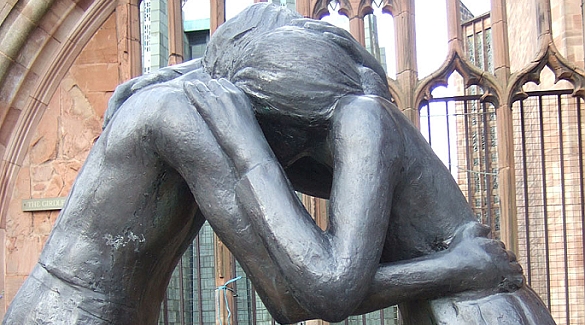
Oct 8, 2016 | Focolare Worldwide

Photo: Reconciliation by Josefina de Vasconcellos at Coventry Cathedral
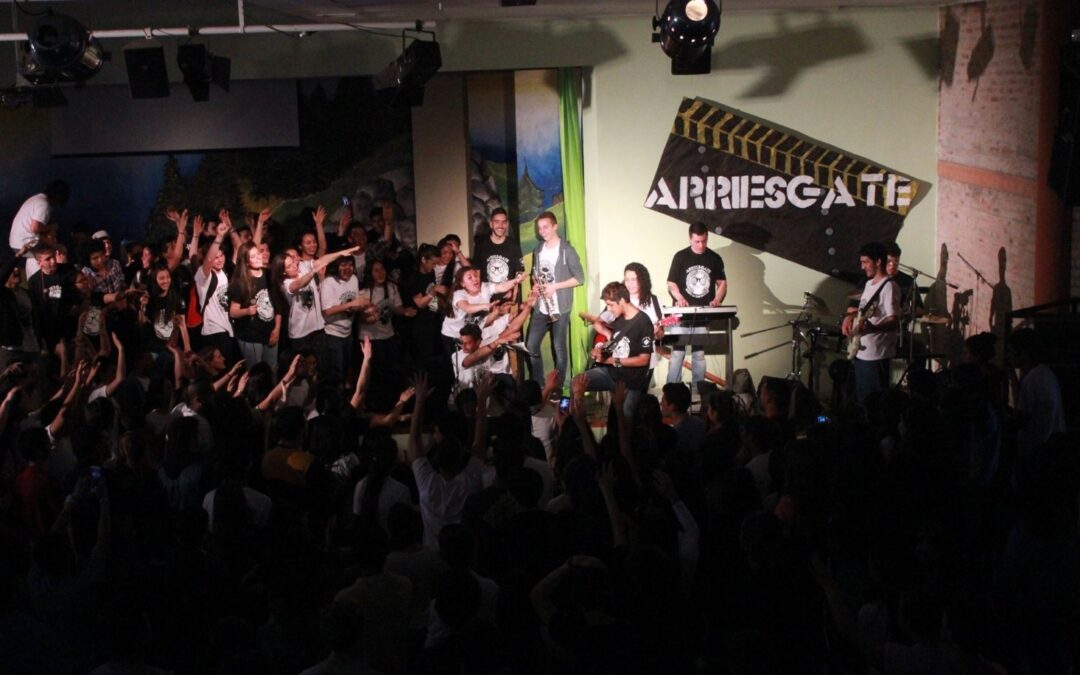
Oct 7, 2016 | Non categorizzato
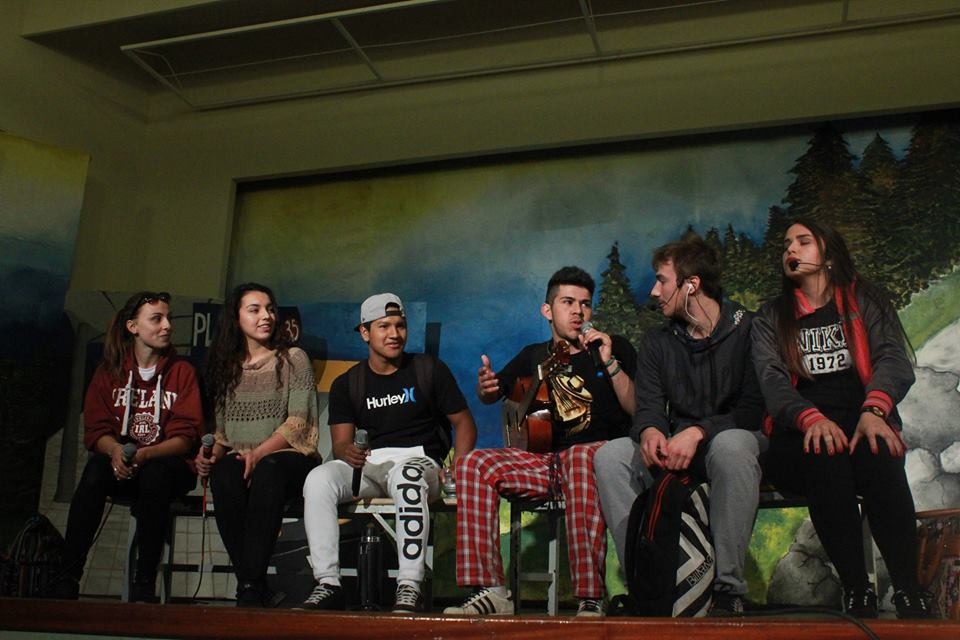 “This festival was an incredible experience! It did its job in my heart and it allowed us to enjoy a very beautiful atmosphere of real brotherhood that recharged the batteries!” “I realized that I can decide to stay inside the cave, or step out of the cave. I discovered how important it is for me to open myself and share with others what is taking place inside me.” “I saw so much vitality, joy and depth in these young people.” “It was a very nice experience. I leave with the certainty that it’s possible to live a different kind of life, that we’re not alone in the effort to be what we really want to be – and to take that risk.” These are only a few of the thoughts that were shared by the thousand young people gathered on September 24-25 for the Youthfest 2016 at the Focolare’s Permanent Mariapolis Lia in the pampas in Argentina. It has become a traditional event that is repeated every year, thanks to the creativity that young people are able to have when it comes to transmitting to their peers the ideals they live for. This year, more than a thousand young people arrived for the event from Paraguay, Uruguay, Chile, Brazil and many cities of Argentina. They were drawn by the title: “Risk it! What you’re looking for exists.” What did the title stand for? An experience of brotherhood, sharing the life of the Gospel for 48 hours, which is the main characteristic of this permanent Mariapolis of the Focolare Movement. Currently 85 young people from 17 countries live there with other families and adults. They share an experience and, through music, theatre and dance also put in common the problems that young people find themselves immersed in: family relations, school, successes and failures in life, addictions, painful moments and, above all, the encounter with a God who is near, who has a personal answer for each and everyone. But the idea didn’t end there: they tried to involve everyone in building a more united world, regardless of one’s religion or belief.
“This festival was an incredible experience! It did its job in my heart and it allowed us to enjoy a very beautiful atmosphere of real brotherhood that recharged the batteries!” “I realized that I can decide to stay inside the cave, or step out of the cave. I discovered how important it is for me to open myself and share with others what is taking place inside me.” “I saw so much vitality, joy and depth in these young people.” “It was a very nice experience. I leave with the certainty that it’s possible to live a different kind of life, that we’re not alone in the effort to be what we really want to be – and to take that risk.” These are only a few of the thoughts that were shared by the thousand young people gathered on September 24-25 for the Youthfest 2016 at the Focolare’s Permanent Mariapolis Lia in the pampas in Argentina. It has become a traditional event that is repeated every year, thanks to the creativity that young people are able to have when it comes to transmitting to their peers the ideals they live for. This year, more than a thousand young people arrived for the event from Paraguay, Uruguay, Chile, Brazil and many cities of Argentina. They were drawn by the title: “Risk it! What you’re looking for exists.” What did the title stand for? An experience of brotherhood, sharing the life of the Gospel for 48 hours, which is the main characteristic of this permanent Mariapolis of the Focolare Movement. Currently 85 young people from 17 countries live there with other families and adults. They share an experience and, through music, theatre and dance also put in common the problems that young people find themselves immersed in: family relations, school, successes and failures in life, addictions, painful moments and, above all, the encounter with a God who is near, who has a personal answer for each and everyone. But the idea didn’t end there: they tried to involve everyone in building a more united world, regardless of one’s religion or belief. 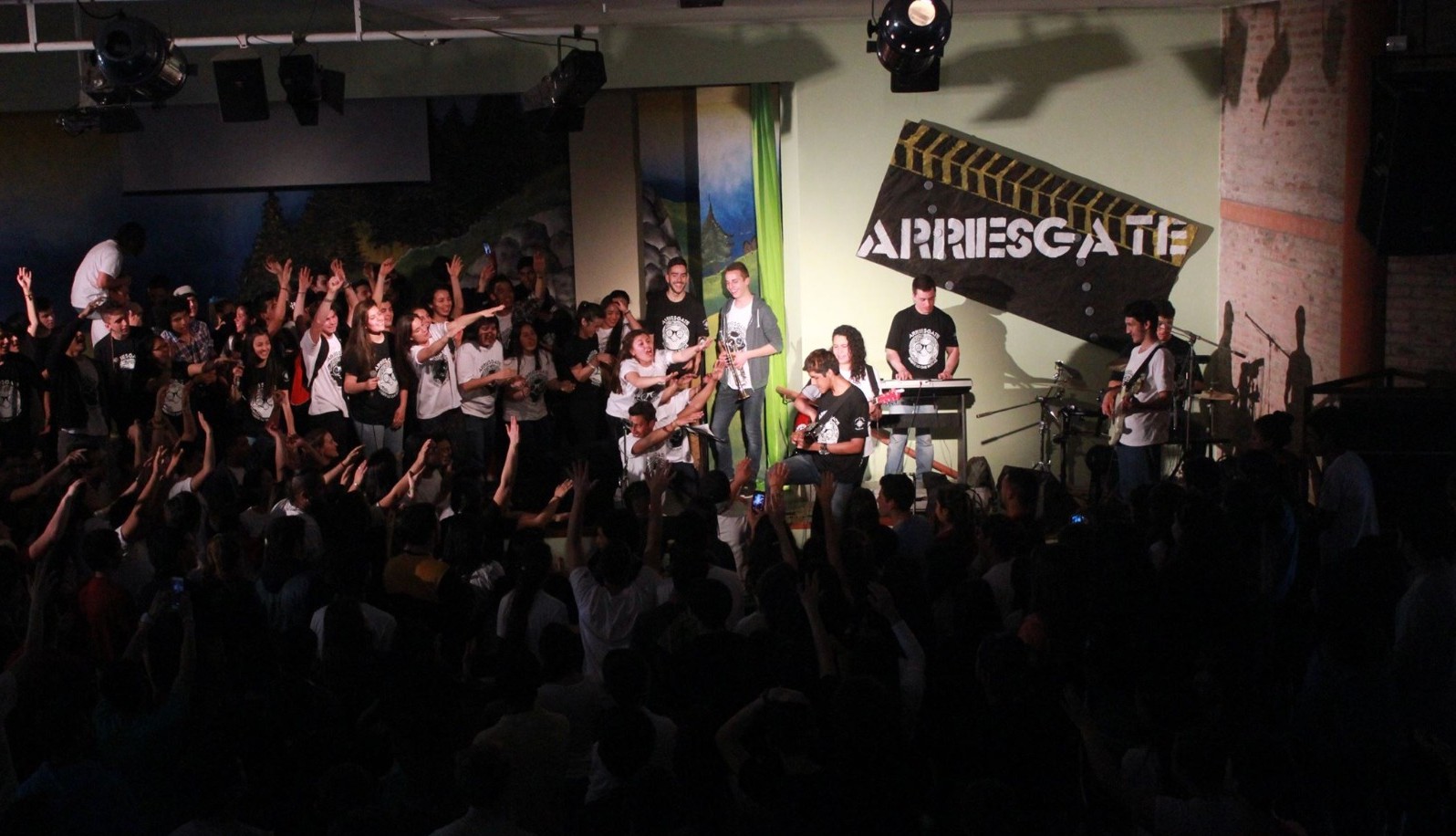 This year’s program was a combination of theatre, music and testimonies that happened on stage, beneath the large emblem that stood at the hall’s entrancel. The sign contained a one-word challenge: RISK IT! The language chosen for conveying the experiences and putting together the theatrical pieces, was direct and personally engaged everyone. The songs that were sung with such energy and captivating rhythm, helped to express this commitment in seeking something great to live for. The outdoor program – like the tour of the Mariapolis, lunchtime, strolling – made room for more sharing among the Latin American young people who had demonstrated their desire and capacity to build a more united world, a society that is for everybody. It didn’t take long for the feedback to arrive: “From Paraguay I want to thank all of you who made us live such and unforgettable day. We’re filled with emotion and prepared to accept the challenge!” “This morning, while I was on the bus going to work,” writes another person who attended the event, “the days we spent together came to mind and the desire to live today well, to give that little extra, to risk it.” Source: Southern Cone website
This year’s program was a combination of theatre, music and testimonies that happened on stage, beneath the large emblem that stood at the hall’s entrancel. The sign contained a one-word challenge: RISK IT! The language chosen for conveying the experiences and putting together the theatrical pieces, was direct and personally engaged everyone. The songs that were sung with such energy and captivating rhythm, helped to express this commitment in seeking something great to live for. The outdoor program – like the tour of the Mariapolis, lunchtime, strolling – made room for more sharing among the Latin American young people who had demonstrated their desire and capacity to build a more united world, a society that is for everybody. It didn’t take long for the feedback to arrive: “From Paraguay I want to thank all of you who made us live such and unforgettable day. We’re filled with emotion and prepared to accept the challenge!” “This morning, while I was on the bus going to work,” writes another person who attended the event, “the days we spent together came to mind and the desire to live today well, to give that little extra, to risk it.” Source: Southern Cone website

 Lionello was born on October 10, 1925 in Parma, Italy. His family was wealthy and raised him to be honest and genuine. He attended high school during World War II and his attention was drawn toward civil society and social problems. In 1943 he enrolled in Law School and graduated with honors in 1947 after having done some prison time for providing help to the partisan movement. After the war he oversaw the educational and cultural activities of the Italian Catholic University Students, as well as the political activities of the Christian Democrats. He served the poor in the Saint Vincent de Paul Society, but feared becoming bourgeois. He joined in an initiative for young people who wanted to deepen their spiritual lives in the light of the Gospel. There he came to know Chiara Lubich‘s spirituality of unity and, in January 1950, Ginetta Calliari, one of the first focolarine. He recalls: “She spoke rather simply, but with quite a bit of conviction. […] The Christianity she was describing seemed so fascinating and fresh that it felt like I was hearing for the first time what Christianity was all about.” This spiritual growth was followed by professional growth becoming Italy’s youngest magistrate. In 1953 he attended the summer Mariapolis where he was immersed in the spirituality of unity. He met Chiara Lubich, Pasquale Foresi and Igino Giordani. Those days would mark his life forever. He remembers them in this way: “That community even though small had a certain completeness of its own: there were consecrated virgins and married couples, people that were not lacking in defects and naivetey. It was an organism into which the Lord had deposited a light, a law, a treasure that was destined to spread to the whole world.” At that Mariapolis he decided to consecrate his life to God in a focolare community. In 1961 he caused a bit of a stir when he left his profession (in the meantime he had been appointed Deputy Prosecutor of the Parma Judiciary) and dedicated himself completely to the Focolare. The weekly newspaper published an article on this Magistrate who had “given up the toga for a Bible.” In 1962 he was awarded the Premio della bontà (Goodness Award) by the Emilia Region of North Italy.
Lionello was born on October 10, 1925 in Parma, Italy. His family was wealthy and raised him to be honest and genuine. He attended high school during World War II and his attention was drawn toward civil society and social problems. In 1943 he enrolled in Law School and graduated with honors in 1947 after having done some prison time for providing help to the partisan movement. After the war he oversaw the educational and cultural activities of the Italian Catholic University Students, as well as the political activities of the Christian Democrats. He served the poor in the Saint Vincent de Paul Society, but feared becoming bourgeois. He joined in an initiative for young people who wanted to deepen their spiritual lives in the light of the Gospel. There he came to know Chiara Lubich‘s spirituality of unity and, in January 1950, Ginetta Calliari, one of the first focolarine. He recalls: “She spoke rather simply, but with quite a bit of conviction. […] The Christianity she was describing seemed so fascinating and fresh that it felt like I was hearing for the first time what Christianity was all about.” This spiritual growth was followed by professional growth becoming Italy’s youngest magistrate. In 1953 he attended the summer Mariapolis where he was immersed in the spirituality of unity. He met Chiara Lubich, Pasquale Foresi and Igino Giordani. Those days would mark his life forever. He remembers them in this way: “That community even though small had a certain completeness of its own: there were consecrated virgins and married couples, people that were not lacking in defects and naivetey. It was an organism into which the Lord had deposited a light, a law, a treasure that was destined to spread to the whole world.” At that Mariapolis he decided to consecrate his life to God in a focolare community. In 1961 he caused a bit of a stir when he left his profession (in the meantime he had been appointed Deputy Prosecutor of the Parma Judiciary) and dedicated himself completely to the Focolare. The weekly newspaper published an article on this Magistrate who had “given up the toga for a Bible.” In 1962 he was awarded the Premio della bontà (Goodness Award) by the Emilia Region of North Italy. 

 The XV General Assembly of the Synod of Bishops, to be held in October 2018, will focus on “Young people, the faith and discerment of vocation”. This decision of Pope Francis arouses joy and interest even in the
The XV General Assembly of the Synod of Bishops, to be held in October 2018, will focus on “Young people, the faith and discerment of vocation”. This decision of Pope Francis arouses joy and interest even in the 




